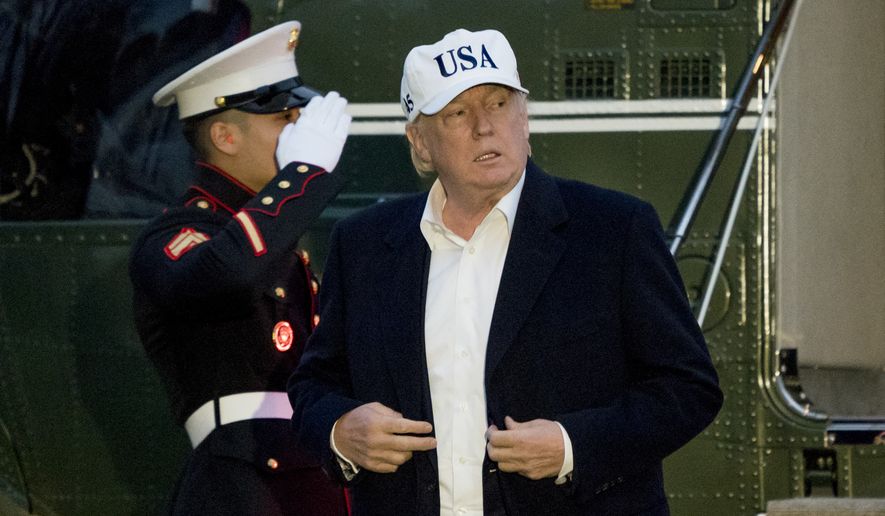President Trump will announce Monday his new National Security Strategy, putting his own stamp on a defense plan that reverses an Obama administration policy by eliminating climate change from a list of threats to national security.
Senior administration officials said Sunday that Mr. Trump will release the plan Monday afternoon in a speech that outlines his emphasis on protecting American economic power as well as securing the homeland.
Officials briefing reporters Sunday confirmed that Mr. Trump’s national security playbook eliminates climate change as a priority in defense planning.
“Climate change is not identified as a national security threat,” an official said, adding that the position is consistent with Mr. Trump’s decision earlier this year to withdraw the U.S. from the Paris climate accord that was signed by President Obama. The official said the importance of “climate and environmental stewardship are discussed” in the plan.
The president’s plan lays out four “vital” national security interests: protecting the homeland and “America’s way of life,” promoting U.S. prosperity, promoting “peace through strength,” and advancing American influence.
“America’s economic security is national security,” the official said. “We will demand fair and reciprocal economic relationships around the world. The economic piece gets much more attention.”
The strategy also affirms the importance to Mr. Trump of alliances such as NATO and the United Nations General Assembly, organizations that have clashed with Mr. Trump’s worldview in the past.
Mr. Obama continually referred to climate change and global warming as one of the biggest threats to U.S. national security and economic prosperity. Mr. Obama made climate change a key part of his National Security Strategy released in 2015, including onerous regulations for addressing global warming.
In September 2016, Mr. Obama issued orders requiring federal agencies to consider the effects of climate change in the development of national security policies.
Mr. Trump’s new plan rejects that outlook, and calls for a balancing of economic and environmental considerations in forging a long-range national security plan.
“An America that is safe, prosperous, and free at home is an America with the strength, confidence, and will to lead abroad,” the draft of the new strategy states. “U.S. leadership is indispensable to countering an anti-growth, energy agenda that is detrimental to U.S. economic and energy security interests.”
The draft also states, “Given future global energy demand, much of the developing world will require fossil fuels, as well as other forms of energy, to power their economies and lift their people out of poverty.
Officials said the move will put into policy Mr. Trump’s view that the U.S. must prioritize national security and economic growth over climate change.
The Trump NSS identifies Russia and China as “revisionist powers,” a group of three major challengers to the U.S., along with “rogue regimes” such as North Korea and “transnational threat organizations” such as the Islamic State terrorist group.
The official said “most people would argue that Russia’s invasion of Ukraine and Georgia” sought to change the status quo, and that China’s building of artificial islands in the South China Sea falls into the same category.
Mr. Trump has been seeking more help from China and Russia in pressuring North Korea to scale back its missile and nuclear weapons programs. The official said the administration still will pursue diplomatic cooperation with China and Russia on a variety of fronts.
“We do not rule out cooperation in any way … we know that we need China and continue to work with them on the [North Korea] problem,” the official said.
• Dave Boyer can be reached at dboyer@washingtontimes.com.




Please read our comment policy before commenting.